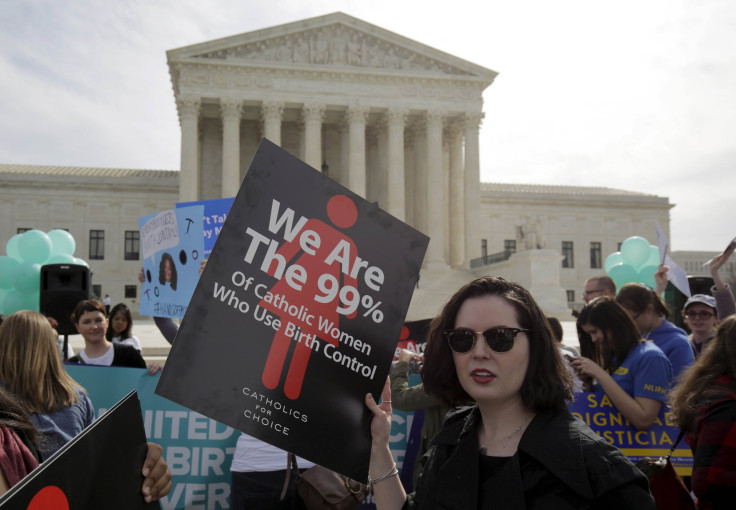Supreme Court Tosses Rulings Backing Obamacare Contraception Coverage

WASHINGTON (Reuters) - The ideologically deadlocked Supreme Court on Monday failed to resolve a major case involving the Obamacare law's mandatory birth control coverage, telling lower courts to reconsider the matter after tossing out their rulings favoring President Barack Obama.
With four conservative justices and four liberals, the court did not rule on the merits of the legal challenge by nonprofit Christian employers who objected to the 2010 healthcare law's requirement that they provide female workers insurance paying for contraceptives.
The court's action avoided a possible 4-4 split that would have affirmed the lower court rulings. The justices, shorthanded following February's death of conservative Justice Antonin Scalia, threw out seven rulings by federal appeals courts around the country that had backed the Obama administration.
The justices handed at least a short-term victory to the nonprofit employers, primarily Roman Catholic organizations.
The decision suggested a possible compromise for the lower courts that would allow women to get contraception coverage without violating the religious rights of employers, by having the government arrange coverage directly with health insurers rather than requiring employers to sign off on it.
"The court expresses no view on the merits of the cases. In particular, the court does not decide whether petitioners' religious exercise has been substantially burdened," the unsigned ruling stated.
In a separate order, the court also sent six other pending cases on the same issue back to lower courts, including two in which the religious employers prevailed.
Among the employers challenging the contraception mandate were the Roman Catholic archdioceses of Washington and Pittsburgh, the Little Sisters of the Poor order of nuns, and Christian colleges.
"We are pleased that the court confirms that there is a path forward that recognizes our religious liberty, yet we also recognize that this struggle will continue," said Cardinal Donald Wuerl, archbishop of Washington.
The justices in previous decisions since 2012 had fended off other major conservative challenges to the Obamacare law, considered Obama's signature domestic policy achievement.
"In this case, it's not obvious an additional justice would have yielded a different result," White House spokesman Josh Earnest said, alluding to the Senate's failure to confirm Obama's Supreme Court nominee Merrick Garland. "But I haven't heard anybody make the argument that leaving the Supreme Court of the United States short-staffed is somehow good for the country."
'SEAMLESS ACCESS'
"We are disappointed that the court did not resolve once and for all whether the religious beliefs of religiously affiliated nonprofit employers can block women’s seamless access to birth control," added Gretchen Borchelt of the National Women’s Law Center.
The dispute before the justices focused on whether nonprofit entities that oppose the contraception mandate on religious grounds can object under a 1993 U.S. law called the Religious Freedom Restoration Act to a compromise measure offered by the Obama administration.
The Christian groups challenged the 2013 compromise that let organizations opposed to providing insurance covering contraception to comply with the law without actually paying for the coverage.
Under the compromise, employers can certify they are opting out of the requirement by signing a form and submitting it to the government. The government then asks insurers to pay the cost of the contraception.
The court's unsigned decision, with no justices issuing a dissent, declined to decide whether the accommodation violates the employers' religious rights by forcing them to authorize the contraception coverage even if they are not paying for it.
Justice Sonia Sotomayor, joined by Justice Ruth Bader Ginsburg, wrote a concurring opinion stressing the narrow nature of the decision. Lower courts should not view the ruling "as signals of where this court stands," Sotomayor wrote.
The court told the lower courts to consider modified positions that the government and the employers have taken following a request by the justices after hearing oral arguments in March for the government and the two sides to outline possible compromises.
The Obama administration had conceded there may be an alternative way of providing birth control coverage without requiring employers to sign off on it.
For their part, the Christian employers said their religious rights would not be infringed upon if the government required coverage to be supplied by their private insurer as long as they do not have to take any action seen as endorsing it.
The Christian employers call birth control immoral and assert that the federal government should not force religious believers to pick between following their faith and following the law.
(Reporting by Lawrence Hurley; Editing by Will Dunham)
Published by Medicaldaily.com



























